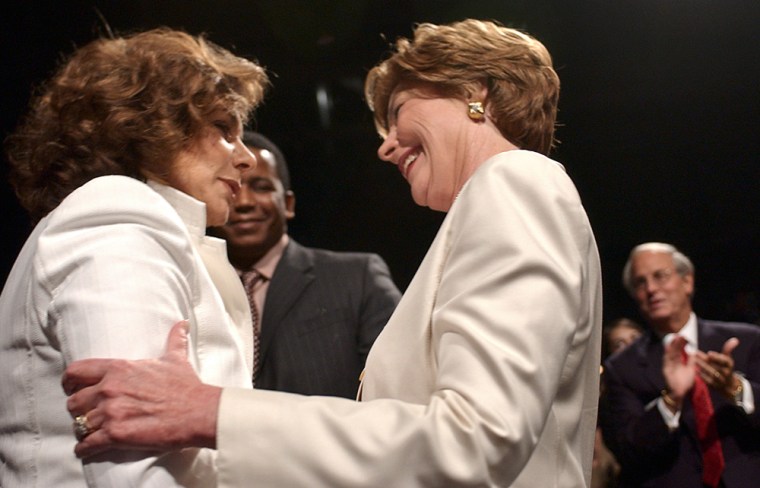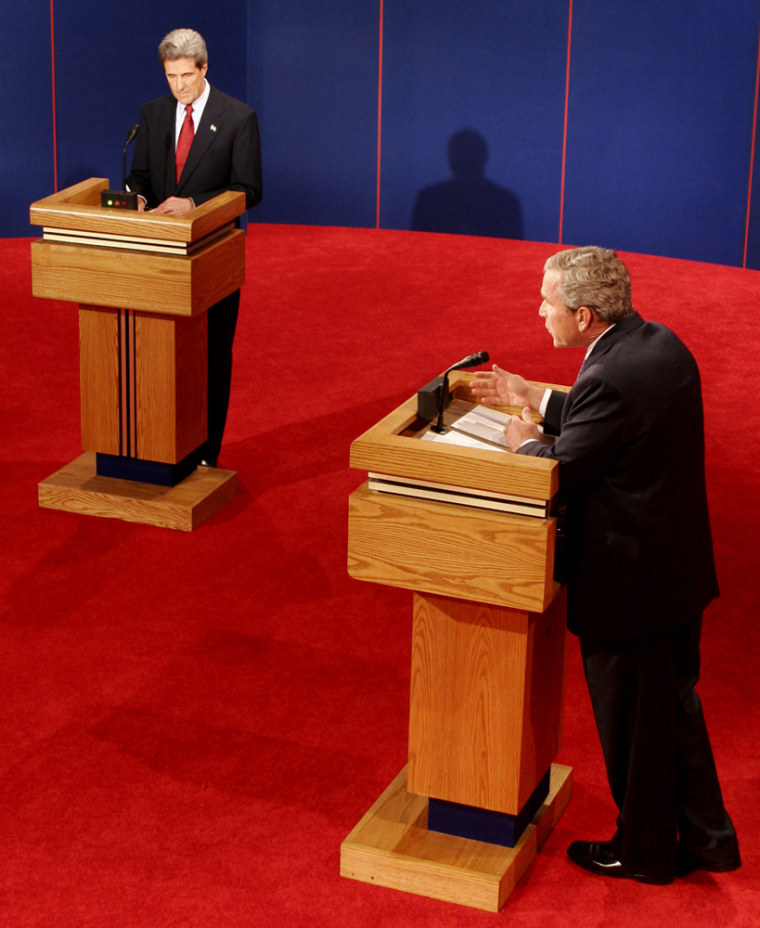Sen. John Kerry assailed President Bush’s prosecution of the war in Iraq in the first presidential debate Thursday night, accusing the president of “a colossal error of judgment” as the candidates finally faced each other after a torrent of speeches and hostile television advertisements.
Kerry wasted no time taking on the marquee issue of the evening, saying in his opening response to a question from moderator Jim Lehrer of PBS that “I can make America safer than President Bush has made us.”
Kerry rejected Republican contentions that he would consult too much with foreign leaders before taking action to secure America, promising that “I’ll never give a veto to any country over our security.”
In response, Bush said that, for better or worse, “people know where I stand” in putting U.S. interests first. He said the United States must “constantly stay on the offensive” against terrorists.
The 90-minute encounter was particularly crucial for Kerry, a Democratic senator from Massachusetts, who is trailing slightly in the polls and struggling for momentum less than five weeks before the election. Kerry faced the challenge of presenting himself as a credible commander-in-chief after a torrent of Republican criticism that he was prone to changing his positions.
Dispute over priorities in Iraq
Kerry repeated his charge that Bush had made “a colossal error of judgment” in Iraq, wasting $200 billion that could have been better spent on domestic priorities. The accusation is somewhat misleading — only about $120 billion has been spent; the rest of Kerry’s calculation includes extra money that the Bush administration has sought from Congress.
Bush in turn rejected Kerry’s contention that he went to war unilaterally, saying, “No one had to tell me to go to the United Nations” to seek support for military action. “I went to the United Nations.”
Like Kerry, Bush was taking liberties with the history of U.S. diplomacy. The administration ignored proposals from other nations that would have put off an invasion to allow U.N. inspectors to keep searching for weapons of mass destruction, which have never been discovered.
Kerry accused Bush of not having a “plan to win the peace,” noting continuing violence and chaos that have left more than 1,000 Americans dead.
Bush pointed out that Kerry voted to give Bush authority to invade Iraq but now says it was “the wrong war at the wrong time.”
“The way to win this is to be steadfast and resolved,” the president said.
Kerry agreed that “we can’t leave a failed Iraq,” but he said Bush was the wrong man to resolve the problems there.
In a Thursday of the lengths to which the insurgents would go, bombs killed 35 children and wounded scores of other people as U.S. soldiers handed out candy at a celebration to inaugurate a sewage plant in Baghdad.
Mike McCurry, a spokesman for the Kerry campaign, told NBC News ahead of the debate that advisers were hoping that the topics of discussion would extend beyond Iraq to include energy independence and U.S. relationships with allies, Iran, North Korea and Africa. But Bush was intent on staying on Iraq.
Aides had promised that the president would aggressively counterpunch if challenged on Iraq, attacking Kerry over what the White House has called his “flip-flops” and contradictions on the war.

Asked how he would better have spent the money devoted to Iraq, Kerry outlined a series of homeland security programs, from police hiring to hardening roads and bridges.
Bush stayed relentlessly on focus, maintaining in passing that “we’re doing everything we can at home” but then stressing that “you better have a president who chases down these terrorists.”
Vote on war funding
Here in Florida and in other states, the Bush campaign continues to air a television advertisement that features video of Kerry making his now-famous statement in March about an appropriations bill to pay for operations in Iraq and Afghanistan: “I actually did vote for the $87 billion before I voted against it.”
Kerry made no excuse for the widely ridiculed remark, saying Thursday night that “I made a mistake in talking about the war. But the president made a mistake in invading Iraq. Which is worse?”
“I will make a flat statement: The United States of America has no long-term designs on staying in Iraq,” he said. “... That’s how we’re going to win the peace, by rapidly training the Iraqis themselves.”
Bush said the remark was evidence of Kerry’s deeper ambivalence about the use of power. “I know we’re not going to achieve our objectives if we send mixed signals to our troops, our friends and the Iraqi people.”
But Kerry said it was Bush who was sending conflicting messages.
“He misled the American people when he said we’d go to war as a last resort,” Kerry said. “We did not go as a last resort. And most Americans know the difference.”
Bush replied: “I decided the right action was in Iraq. My opponent calls it a mistake. It wasn’t a mistake. ... I think what is misleading is [when] you can say you can lead in Iraq when you keep changing your positions.” He said U.S. troops in Iraq must be wondering, “How can I follow this guy?”
Question over proper target
Kerry accused Bush of diverting resources from the proper target, Afghanistan, to pursue an unnecessary goal in Iraq.
“Iraq was not even close to the center of the war on terror before the president invaded it,” Kerry said, adding later, “Saddam Hussein didn’t attack us. Osama bin Laden attacked us.”
Bush responded firmly, declaring: “Under my leadership, we’re going to win this war in Iraq.”
The president sidestepped a politically charged question from Lehrer, who asked whether the United States would suffer another terrorist attack if Kerry were elected.
“No, I don’t believe it’s going to happen. I believe I’m going to win,” he said.
Bush also refused to rise to the bait of a question about Kerry’s character, a topic that created great tension between the two camps as groups supporting Bush accused Kerry of falsifying his military record in Vietnam. “That’s a loaded question,” he said.
“I admire Senator Kerry’s service to our country,” Bush said. But the president added: “I just know how this world works, and in the councils of power there must be certainty from the U.S. president.”
The president’s campaign continued the theme in the post-debate tradition of lobbying the media to put the best spin on its candidate’s performance. “We still don’t know exactly what [Kerry’s] plan is in Iraq,” Matthew Dowd, Bush’s chief campaign strategist, told MSNBC.
Marc Racicot, chairman of the Bush-Cheney campaign, said in a statement: “People saw for themselves tonight where John Kerry would lead our military, our allies and the world in the war on terror — down a bumpy road paved with indecision and cynicism.”
Sen. Joseph Biden, D-Del., speaking for Kerry’s campaign, responded by criticizing Bush’s “mixed messages in terms of Iraq, Korea, Iran. I thought John did very, very well,” he said on MSNBC’s “Hardball.”
Other topics
Both men agreed that U.S. troops should not be sent to Sudan to resolve what Bush called “the genocide” in the Darfur region, where conflict has driven 1.4 million non-Arab villagers from their homes and more than 50,000 people have died.
Asked to name the biggest threat to the world, Kerry said, “Nuclear proliferation.” He promised to shut down international criminal networks trading in nuclear materials, especially in border regions of Russia, where he said he would “get the job done in four years.”
Bush said he “agreed with my opponent,” but he changed the terms of the agreement. While Kerry’s response focused on nuclear materials, Bush expanded the definition to mean “weapons of mass destruction in the hands of terrorists.”
Asked to clarify whether he really agreed that the biggest threat was nuclear proliferation, Bush repeated, “In the hands of terrorist enemies.”
On North Korea, the rogue state most rapidly seeking to develop a usable weapon, Bush said he would continue to pursue his strategy of multilateral negotiations among the United States, China, Japan, Russia and South Korea. Kerry advocated direct bilateral talks with North Korea to find a solution.
The 90-minute debate unfolded scarcely a month before the election, the first in a series of high-stakes encounters between the two men, who meet Oct. 8 in St. Louis and again Oct. 13 in Tempe, Ariz.
Vice President Dick Cheney and Kerry’s running mate, Sen. John Edwards of North Carolina, hold their only face-to-face debate of the campaign Tuesday in Cleveland.
